 After the prayers and the celebration of the Eucharist in the early morning, those taking part in the meeting of the major Superiors of the Order welcomed Hipólito Pérez, a Marist religious brother from Spain who has been involved in youth animation for a long time, above all in the context of his religious Province in Central America. The subject that he addressed was ‘Initial and Ongoing Formation and the Promotion of Vocations. Consecrated Life and Young People’.
After the prayers and the celebration of the Eucharist in the early morning, those taking part in the meeting of the major Superiors of the Order welcomed Hipólito Pérez, a Marist religious brother from Spain who has been involved in youth animation for a long time, above all in the context of his religious Province in Central America. The subject that he addressed was ‘Initial and Ongoing Formation and the Promotion of Vocations. Consecrated Life and Young People’.
The aim was to provide a realistic view of the world of young people in our contemporary situation. The first and fundamental objective of pastoral care for vocations is to propose – by contacts and/or imitation – the option of discipleship of Jesus through a Christian experience of fraternal community. Only after an extended experience of following Jesus in a community are young people invited to reflect on what is the most suitable way to live this following of Jesus in their lives.
One fact is certain: a direct encounter with young people generates a feeling of concern in us: young people were born and have grown up in a context (neo-liberal globalisation) which at a social and cultural level, and at the level of values, learning and communication, is very different from the context that characterises our intellectual, spiritual and relational structures.
From this it follows that the principles, the idea of what a human being is, the processes, the decisions, and the motivations that young people live in the modern and post-modern context must be understood in a more effective way by us, not so much in order to share them but, rather, in order to create new forms of encounter and dialogue. This must be done in order to be able to enter their dynamics of meaningful life experiences and thus accompany them in processes involving the construction of their identities so that they can live in a community in an authentic way, where that community constitutes a significant reference point. In this way, they can internalise their beliefs in a deeper way and personalise the formative processes of their growth. From this derives the inescapable importance of the meaning of our witness. These young people (the millennials generation who are digitalised, connected and globalised) should be welcomed with a positive approach – they will be the Christians and/or religious of the twenty-first century.
It is clear that the experience of fraternal religious community that we are able to offer requires the presence of religious communities – of individual religious – that are ‘healthy’ and where the thirst for truth and for authenticity that young people bring with them can be assessed and implemented.
In this anthropo-social-cultural context of the world of young people who are experiencing a ‘human situation’ that is totally new, which vocational culture should be lived and which pedagogic keys should be adopted?
It is likely that we are witnessing the birth of a new way of understanding human beings and of a new paradigm based upon three pillars: constant information; a supply of consumer goods taken to extremes; and an image culture filtered by the mass media. There is a constant acceleration in changes affecting humanity and the planet, with the intensification of the rhythms of life. Young people and our young religious receiving formation take part in this dimension which, indeed, is in a state of permanent acceleration. The crisis of religions is a crisis of language – the temptation to reduce ‘mystery’ to what is evident. The very dimension of ‘mystery’ should be offered anew to young people, but with vigorous and nutritious words.
The culture of vocations that should be developed is the offering of a new anthropological vision of man, of peace, of the environment, of solidarity, and of the systematic use of energies for the growth of the community. It is evident that the culture of vocations should belong in an integrated way to all the other forms of pastoral care of the Church.
Specific pastoral care for vocations (with the objective of following Jesus) belongs to, and encounters as its vital space, pastoral care for young people (with the objective of meeting Jesus); pastoral care for young people is completed and built up when it opens up to the dimension of vocations.
Which strategic options should be adopted? They are: interior prayer; the accompanying of the young person’s family; pastoral synergy; clear proposals; the cooperation of religious and lay people; the formation of pastoral workers; contacts with young people; making the young people themselves the principal creators of the process; personal accompanying; and intelligent sensitivity in the use of the mass media to establish contacts and organise meetings. These are instruments that are useful in helping young people to ‘narrate themselves’ and ‘to narrate’ their own existences and their experiences of God, their relationships, their expectations, their fears…
The key basic approaches that should be adopted are interiority and spirituality as settings for introspection and growth in self-knowledge; communion between religious and lay people; and solidarity and self-giving (encounter with human suffering).
For our part, as consecrated men, we are called to become religious communities that offer meaningful experiences of life, of fraternal life (sharing, formation, narration, celebration, assessment, forgiveness), in which the experience of knowing and following Jesus himself can be explored; the dynamics of growth in personal autonomy can be developed; and experiences of service and growth in solidarity can be lived…religious communities of consecrated men that are able call upon the deep concern of those young men who spend time in them.
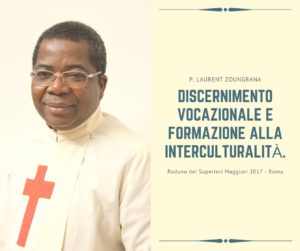 In the afternoon Fr. Laurent Zoungrana, the Vicar General of the Order and the member of the General Consulta responsible for formation, led us into this subject and focused on its basic aspects: 1). the current situation of the dimension of formation, looking towards the future of the Order; and 2. discernment in relation to vocations and formation in interculturality.
In the afternoon Fr. Laurent Zoungrana, the Vicar General of the Order and the member of the General Consulta responsible for formation, led us into this subject and focused on its basic aspects: 1). the current situation of the dimension of formation, looking towards the future of the Order; and 2. discernment in relation to vocations and formation in interculturality.
Some elements relating to the dimension of the initial formation and ongoing formation of consecrated men were highlighted by the Vicar General.
The role of nearness and proximity that Superiors must have in relation to the consecrated people that are entrusted to them is of fundamental importance. The animation of vocations and formation is an area that should not delegated to other people. Superiors themselves should be involved so that the providers of formation, the animators of vocations and those receiving formation do not feel alone and abandoned. It is for this reason that the text ‘New Wineskins for New Wine’, drawn up by the Congregation for Institutes of Consecrated Life and Societies of Apostolic Life, talks about ‘accompanying with sincere and constructive dialogue’.
On 6 June 2005, when speaking about education in general and not specifically religious education, Benedict XVI observed: ‘We know well that for an authentic educational endeavour, communicating a correct theory or doctrine does not suffice. Something far greater and more human is needed: the daily experienced closeness that is proper to love, whose most propitious place is above all the family community, but also in a parish, movement or ecclesial association, in which there are people who care for their brothers and sisters because they love them in Christ, particularly children and young people, but also adults, the elderly, the sick and families themselves. The great Patron of educators, St John Bosco, reminded his spiritual sons that “education is something of the heart and that God alone is its master”’.
Connected with formation or education in consecrated life is the dimension of fraternity. The difficulties require that fraternal life is promoted where humanising and gospel elements find a balance so that each religious feels jointly responsible and at the same time is seen as indispensable for the construction of fraternity. Indeed, fraternity is the setting for high-quality ongoing formation. The promotion, animation and construction of fraternity as a setting for high-quality ongoing (and initial) formation is the task of the Superiors of a community and particularly of the major Superiors. We are thus called to look after a community so that fraternity is experienced and fraternity becomes a setting for the handing down of the values of education and formation.
As was emphasised in 1990 in the document of the Congregation for Institutes of Consecrated Life and Societies of Apostolic Life ‘Directives on Formation in Religious Institutes’, ‘community life enjoys a privileged role in formation at every stage. Formation depends to a great extent on the quality of this community. This quality is the result of its general climate and the style of life of its members, in conformity with the particular character and spirit of the institute’ (n. 26). A community is formative to the extent that it permits each one of its numbers to grow in fidelity to the Lord according to the charism of his or her institute. To accomplish this, the members must be clear among themselves on why the community exists, and on its basic objectives. Their interpersonal relationships will be marked by simplicity and confidence, being based primarily upon faith and charity. Toward this end, the community is formed each day under the action of the Holy Spirit, allowing itself to be judged and converted by the Word of God, purified by penance, constructed by the Eucharist, and vivified by the celebration of the liturgical year. It strengthens its communion by generous mutual assistance and by a continuous exchange of material and spiritual goods, in a spirit of poverty and with the help of friendship and dialogue. The community lives the spirit of its founder and the rule of the institute profoundly. Superiors will consider it their particular office to seek to build a community of brothers or sisters in Christ (cf. can. 619). Then, each one, aware of his or her responsibility within the community, is moved to grow, not only for self but for the good of all’ (n. 27).
Faced with a shortage or an abundance of vocations, we need providers of formation who are able to engage in good discernment and offer our Order and the Church religious who are happy to be Camillians and able to hand down the charismatic values that St. Camillus bequeathed to us. In this sense, we should affirm, as the Camillian Project does, that ‘the formation of the providers of formation constitutes an absolute priority in which the Order is called to invest continuously. Their specific training, which should not be only academic (psycho-pedagogic) but also experiential and ministerial (pastoral and spiritual), is the best guarantee there is for the future itself of the Order. Whereas in the case of the promotion of vocations it is right to involve the younger religious, in the case of the field of formation religious should be co-opted who have gone through at least six years (two three-year periods) of community religious life lived in the practical implementation of our charism’ (Camillian Project, n. 2.4). Even though we have observed in recent years efforts made in the direction of providing formation to the providers of formation in our Order, one has to say that this is not sufficient and that this area should be taken seriously if we want a serious formation of our candidates.
In the ‘Camillian Project’ the restructuring of the Order requires that we should bring together our forces at the level of formation in order to be more effective: ‘The important and delicate field of initial formation is perhaps that aspect which highlights in an unequivocal way the need for the unification of our efforts and cooperation between Provinces and/or interchange with other Institutes, both to achieve a more effective optimisation of resources and to secure a more complete formation of our candidates’ (n. 2.4). This need for the unification of efforts and for cooperation encounters difficulties in finding expression in formation and it is something that requires our attention. Perhaps a change in mentality is required, an overcoming of provincialism, which will help us to understand that we cannot go on running forward alone. Internationalisation or globalisation is a given fact that cannot be ignored and leads us to unite our forces in order to provide a formation of high quality that is able to be incisive in contemporary culture. Furthermore, the future of our Order requires providers of formation who are able to train those receiving formation in internationality and interculturality.
All of this expresses the need and indeed the urgent need for the training of the providers of formation in being able to respond in the best way, during the formation of candidates, to the multiculturality or interculturality which have taken possession of religious communities and in particular our houses for formation. In this area, the major Superiors have a role and a responsibility in the formation of the providers of formation because today good will alone is not enough. Good will needs good instruments of accompanying to achieve suitable formation. One of the instruments that can help the provider of formation to carry out his mission is the Rules for Formation which will the principal subject of the international meeting of providers of formation that will be celebrated in October 2017.
An assessment of our meeting will end this Meeting of the Major Superiors of the Order of the year 2017.
On Friday 30 June and Saturday 1 July those taking part in the meeting will go on a pilgrimage to the places where the conversion of St. Camillus took place and where he is commemorated (Manfredonia-Chiesa San Domenico, Valle dell’Inferno, San Giovani Rotondo), accompanied and welcomed by the religious of the Camillian community of Macchia di Monte Sant’Angelo.



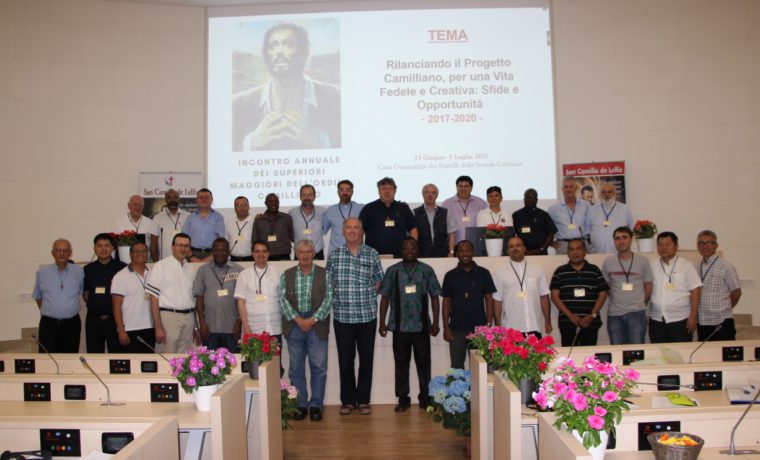
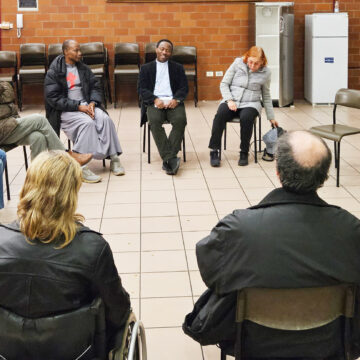
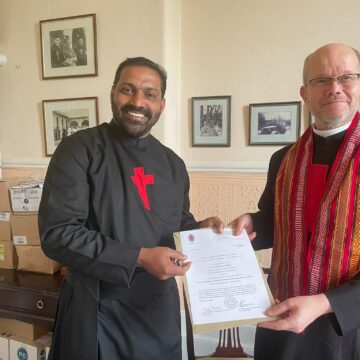
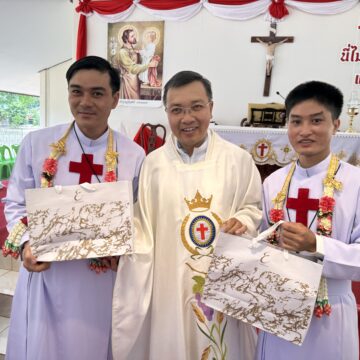
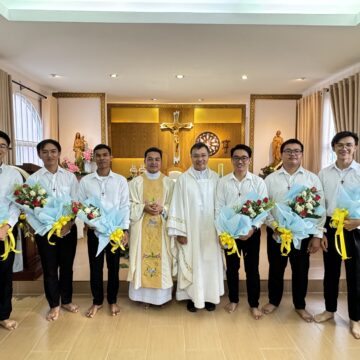
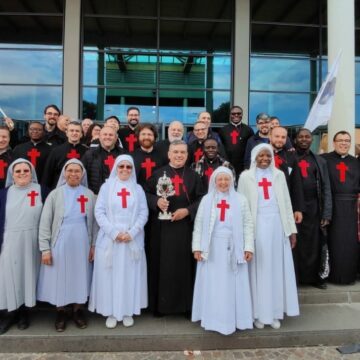
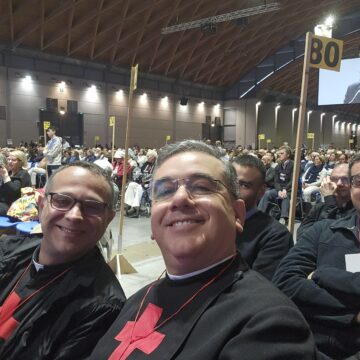
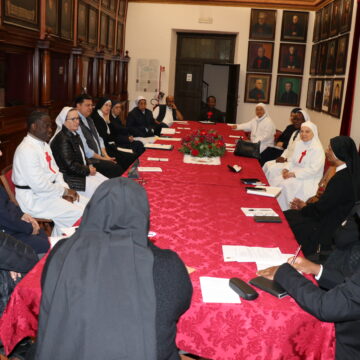
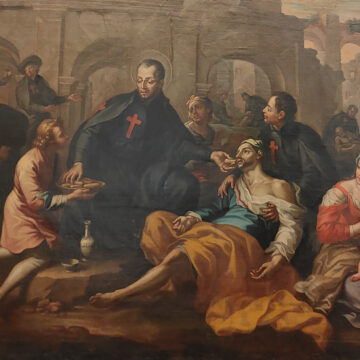




Camillians on Facebook
Camillians on Twitter
Camillians on Instagram